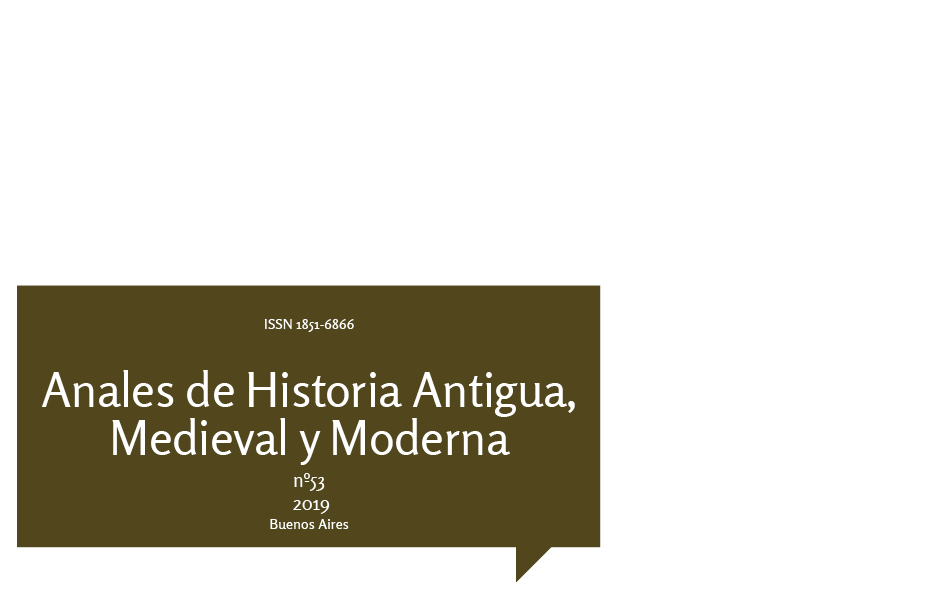Use and Abuse of Religion in the Political Geostrategy of Cleomenes I
Abstract
The reign of Cleomenes I has traditionally been considered as the starting point of Sparta's expansionist policy beyond the borders of the Peloponnese. To accomplish his objectives, the dyarch made a boldly use of religion, exploiting especially the prophecies issued by the Delphic oracle. Events like the failed campaigns against Athens, the attack on Argos, or the political intrigues Cleomenes I promoted were all conveniently supported by mystical justifications. Equally admired and reviled by modern historiography, Cleomenes I is a turbulent figure in the history of Sparta whose death is surrounded by mystery. Using a number of ancient sources, among which Herodotus of Halicarnassus stands out, this paper will analyse to what extent this controversial figure made use of religion, the reasons that motivated the aggressive Spartan policy (noticeable since late VI to early V century BC), as well as the tactics employed by the king in order to prevail over political adversaries within the Spartan ruling class.Downloads
References
Balasch, M. (Trad.). (1999). Heródoto: Historias. Madrid: Cátedra.
Baltrusch, E. (1994). Symmachie und Spondai. Untersuchungen zum griechischen Völkerrecht der archaischen und klassischen Zeit (8.-5. Jahrhundert v. Chr.). Berlin: De Gruyter.
Barceló, P. y Hernández de la Fuente, D. (Eds.). (2014). Historia del pensamiento político griego. Teoría y praxis. Madrid: Trotta.
Bonnechère, P. (2013). La “corruption” de la pythie chez Hérodote dans l’affaire de Démarate (VI, 60-84). Du discours politique faux au discours historique vrai. DHA, 8, 305-325.
Braccesi, L. (1999). L’enigma Dorieo. Roma: “L'Erma” di Bretschneider.
Bury, J. B. (1902). The Epicene Oracle Concerning Argos and Miletus. Klio, 2, 14-25.
Carlier, P. (1977). La vie politique à Sparte sous le règne de Cléomène Ier. Essai d’interprétation. Ktèma, 2, 65-84.
Cartledge, P. (1979). Sparta and Lakonia. A Regional History. 1300 to 362 BC. Nueva York: Routledge.
Cartledge, P. (2009). Los espartanos. Una historia épica. Barcelona: Ariel.
Cawkwell, G. (1993). Sparta and her Allies in the Sixth Century. CQ, 43, 364-376.
De Ste. Croix, G. E. M. (2004). Herodotus and King Cleomenes I of Sparta. En D. Harvey y R. Parker (Eds.), Athenian Democratic Origins and Other Essays (421-440). Oxford: Oxford University Press.
Domínguez Monedero, A. J. (2010). Destrucción de la naturaleza y castigo divino: Cleómenes de Esparta y el bosque sagrado de Argos. En S. Montero y M. C. Cardete (Eds.), Naturaleza y religión en el mundo clásico. Usos y abusos del medio natural (125-142). Madrid: Signifer.
Fornis, C. (2016). Esparta. La historia, el cosmos y la leyenda de los antiguos espartanos. Sevilla: Universidad de Sevilla.
Fornis, C. y Domínguez Monedero A. J. (2014). El conflicto entre Argos y Esparta por la Tireátide y el culto a Apolo Piteo. Gerión, 32, 79-103.
Forrest, W. G. (1960). Themistocles and Argos. CQ, 10, 221-240.
Forrest, W. G. (1968). A History of Sparta. Londres: Hutchinson.
Grimal, P. (1981). Diccionario de mitología griega y romana. Barcelona: Labor.
Hansen, M. H. y Nielsen, T. H. (Eds.). (1994). An Inventory of Archaic and Classical Poleis. Oxford: Oxford University Press.
Hard, R. (2016). El gran libro de la mitología griega. Madrid: La esfera de los libros.
Harvey, D. (1979). Leonidas the Regicide? Speculations on the Death of Kleomenes I. En G. W. Bowersock et al. (Eds.), Arktouros. Hellenic Studies presented to Bernard M. W. Knox on the occasion of his 65th birthday (253-260). Berlin: De Gruyter.
Hendricks, I. H. M. (1980). The Battle of Sepeia. Mnemosyne, 33, 340-346.
Herrero Ingelmo, M. (1994). Pausanias. Descripción de Grecia. Madrid: Gredos.
Huxley, G. L. (1962). Early Sparta. Londres: Faber.
Huxley, G. L. (1983). Herodotos on Myth and Politics in Early Sparta. Proceedings of the Royal Irish Academy, 83, 1-16.
Kelly, T. (1970). The Traditional Enmity between Sparta and Argos. The Birth and Development of a Myth. American Historical Review, 7, 971-1003.
Lévy, E. (2003). Sparte: histoire politique et sociale jusqu’à la conquête romaine. Paris: Seuil.
Loraux, N. (1977). La ‘belle mort’ spartiate. Ktèma, 2, 105-120.
López Salvá (1987). Plutarco. Obras morales y de costumbres. Madrid: Gredos.
Malkin, I. (1987). Religion and Colonization in Ancient Greece. Leiden: Brill.
Millender, E. G. (2018). Kingship: The History, Power, and Prerogatives of the Spartans´ ‘Divine’ Dyarchy. En A. Powell (Ed.). A Companion to Sparta (452-479). Hoboken: Wiley Blackwell.
Murcia Ortuño, J. (2017). Esparta. Madrid: Alianza.
Nafissi, M. (2010). The Great rhetra (Plut. Lyc. 6): A Retrospective and Intentional Construct?. En L. Foxhall et al. (Eds.). Intentionale Geschichte. Spinning Time in Ancient Greece (89-119). Stuttgart: Steiner.
Nafissi, M. (2018). Lykourgos the Spartan ‘Lawgivwer’. Ancient Beliefs and Modern Scholarship. En A. Powell (Ed.). A Companion to Sparta (93-124). Hoboken: Wiley Blackwell.
Scott, M. (2015). Delfos. Historia del centro del mundo antiguo. Barcelona: Ariel.
Sierra Martín, C. (2014). La ‘edad de los tiranos’: una aproximación a las ambigüedades de la tiranía arcaica. Gerión, 32, 57-77.
Tomlinson, R. A. (1972). Argos and the Argolid. From the End of the Bronze Age to the Roman Occupation. Londres: Routledge.
Valdés Guía, M. (2002). Areópago y prítanos ton naukraron: crisis política a finales del s. VII a. C. (de Cilón a Solón). DHA, 28, 65-101.
Valdés Guía, M. (2005). La batalla de Sepea y las Hybristika: culto, mito y ciudadanía en la sociedad argiva. Gerión, 23, 101-114.
Von Stauffenberg, A. G. S. (1960). Dorieus. Historia, 9, 181-215.
Yates, D. C. (2005). The Archaic Treaties between the Spartans and Their Allies. CQ, 55, 65-76.
Zahrnt, M. (1989). Delphi, Sparta und die Rückführung der Alkmeoniden. Zeitschrift für Papyrologie und Epigraphik, 76, 297-307.








